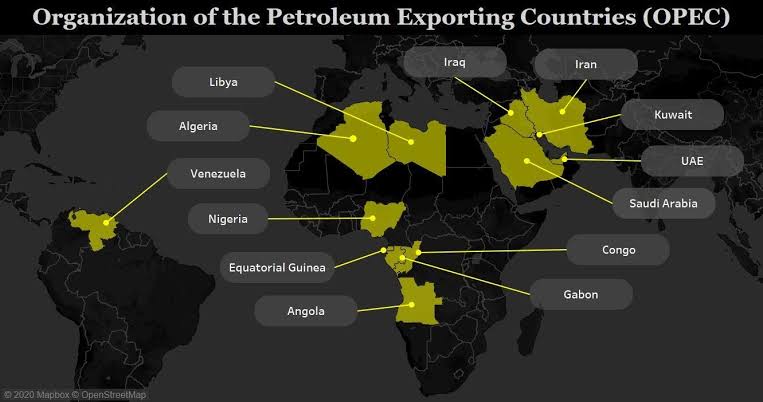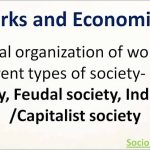
• The Organisation of the Petroleum Exporting Countries, or OPEC, was founded in 1960 by Iran, Iraq, Kuwait, Saudi Arabia, and Venezuela at the Baghdad Conference in Iraq. It is a stable, government-to-government organisation.
Its offices were first in Geneva, Switzerland, but in 1965, they were moved to Vienna, Austria. It is responsible for about 44 percent of the world’s oil production and 81.5 percent of the world’s “proven” oil reserves.
Brief History:
• Representatives from the governments of Iran, Iraq, Kuwait, Saudi Arabia, and Venezuela met in Baghdad to talk about how to raise the price of crude oil produced in their countries and how to reply to actions taken by the MOCs without consulting them.
• Even though the US was against it, Saudi Arabia and other oil-producing Arab and non-Arab countries formed the Organisation of Petroleum Producing Countries (OPEC) to get the best price possible from big oil companies.
• At first, Arab countries wanted Beirut or Baghdad to be the OPEC’s headquarters. But Venezuela strongly objected, and Geneva, Switzerland, was picked because it was neutral. Because Switzerland didn’t give formal guarantees, OPEC moved its headquarters to Vienna, Austria, on September 1, 1965.
• At the beginning of the 1970s, OPEC members made up more than half of the world’s oil supply.
• On November 5, 2019, the 2019 OPEC World Oil Outlook (WOO) was released at the Wiener Borse in Vienna, Austria.
Goal:
Member countries’ oil policies should be coordinated and unified.
• To make sure that oil companies get fair and stable prices,
• The regular, efficient, and cheap delivery of oil to countries that use it. • A fair return on investment for those who put money into the business.
Member
Currently, the Organization has a total of 13 Member Countries
• Right now, Algeria, Angola, Congo, Equatorial Guinea, Gabon, Iran, Iraq, Kuwait, Libya, Nigeria, Saudi Arabia, the United Arab Emirates, and Venezuela are all part of the Organisation.
After the five Founding Members, eight other countries joined: Qatar in 1961, Indonesia in 1962, Socialist People’s Libyan Arab Jamahiriya in 1962, UAE in 1967, Algeria in 1969, Nigeria in 1971, Ecuador from 1973 to 1992, and Gabon from 1975 to 1994.
• Qatar stopped being a member on January 1, 2019. Ecuador stopped being a member in December 1992, but it rejoined OPEC in October 2007. However, it has chosen to leave OPEC on January 1, 2020.
Functions of OPEC
OPEC’s Functions are to look at the current state of the international oil market and the predictions for the future so that they can agree on the right steps to take to keep oil prices stable.
• At the OPEC gathering, decisions are made about how much oil to make based on how much oil is expected to be needed.
• Helps the secretariat, which sends news and information to the rest of the world, with study and administrative tasks.
Russia and OPEC:
• Russia is the third biggest oil producer in the world, making up 12% of all oil made.
• This means that they also have a lot of power over the oil supply around the world.
• In 2017, OPEC and Russia began working together loosely to cut production and keep prices high. This happened at a time when oil prices were at their worst.
• So, two big groups work together to keep prices fixed, which clearly works.
OPEC+
• OPEC plus countries are those that sell crude oil in addition to the 14 OPEC countries.
Azerbaijan, Bahrain, Brunei, Kazakhstan, Malaysia, Mexico, Oman, Russia, South Sudan, and Sudan are all part of OPEC plus.Saudi Arabia and Russia have been at the centre of an oil-producing group called OPEC Plus for the past three years. The group, which now has 11 OPEC members and 10 non-OPEC countries as members, aims to keep oil prices high by cutting production.






![UPSC CSE Topper Mains Answer [Part 1] images-2023-06-17T191749.185](https://iasbio.com/wp-content/uploads/2023/06/images-2023-06-17T191749.185-150x150.jpeg)

![UPSC CSE Topper Mains Answer [Gaurav Agarwal] word-image-10753-1](https://iasbio.com/wp-content/uploads/2023/06/word-image-10753-1-150x150.png)







